Dimanche, 28 août 2011
Traduction: [ Google | Babelfish ]
Catégories : [ TV/Cinéma ]
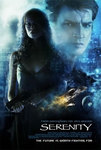
Wikipedia
Due to overpopulation, Humanity has moved to another star system made of a
dozen planets. Some of those have a common government, the Alliance, but the
others are more like the Far West. River is a psychic who has been
conditioned by the Alliance, but is rescued by her brother. They are chased by
an unnamed Alliance agent, and find refuge on the Firefly by becoming
passengers of the ship. Reynolds, the ship's captain who had fought during the
failed rebellion agains the Alliance, has to resort to raiding banks for
survival. At a bar, River receives a subliminal message and starts fighting
everyone until her brother shouts a secret keyphrase that makes her sleep.
Reviewing recordings of the incident with the help of a hacker, Mr. Universe,
they notice that River said “Miranda” before starting to fight. Reynolds
wants to get rid of the unpredictable River and her brother, but he is then
contacted by the Alliance agent who makes clear he wants to kill River.
Malcolm refuses to surrender her. The agent then kills all the people who have
helped Malcolm in the past. River then tells Reynolds where to find Miranda,
an planet marked as unhabitable. To go there, they have to cross a region of
space controlled by the Reavers, mad humans who raid ships and eat people
alive. They disguise the Firefly as an ship that has already been a victim of
the Reavers, and manage to reach Miranda. Upon landing there, the crew of the
Firefly discovers that the planet is perfectly habitable, but all its
inhabitants are dead, bearing no sign of fight or pain. They later find a
recording explaining that the Alliance has tried a drug that would make people
more peaceful, but it just made people completely inactive, and they
eventually died. One small fraction reacted in the opposite way and became the
Reavers. Reynolds then decides to broadcast the message through Mr. Universe's
equipment, but the agent knows what he intends to do and is waiting for him
with a whole fleet. Reynolds attracts the Reavers's ships that are around
Miranda and unleashes them on the Alliance's fleet. The Firefly then lands on
Mr. Universe's planet. The crew barricades itself to hold the attacking
Reavers back, Mr. Universe has already been killed by the agent, but after a
fight with the latter, Reynolds manages to broadcast the message and let the
truth about the scheme of the Alliance be revealed.
[ Posté le 28 août 2011 à 10:15 |
pas de
commentaire |
lien permanent ]
Adresse de trackback
https://weber.fi.eu.org/blog/TV/Cinema/serenity.trackback
Commentaires
Aucun commentaire
Samedi, 27 août 2011
Traduction: [ Google | Babelfish ]
Catégories : [ Bière/Adnams ]
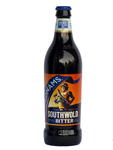
Quite bitter, otherwise just another ale. Contains malted barley.
Adnams, Southwold, Suffolk, England. 4.1% alcohol.
[ Posté le 27 août 2011 à 20:28 |
pas de
commentaire |
lien permanent ]
Adresse de trackback
https://weber.fi.eu.org/blog/Biere/Adnams/adnams_southwold_bitter.trackback
Commentaires
Aucun commentaire
Catégories : [ Bière/Little Valley ]
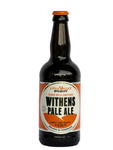
“Light version of the traditional IPA. Whitens is steeped with Cascade
hops… floral aroma with hints of spice, citrus and orange”
Most probably the same as Little Valley's Withens
IPA.
This time, I could easily notice the hint of orange in the taste. Contains
barley malt and wheat malt.
Little Valley Brewery, Hebden Bridge, West Yorkshire, England. 3.9% alcohol.
[ Posté le 27 août 2011 à 19:09 |
pas de
commentaire |
lien permanent ]
Adresse de trackback
https://weber.fi.eu.org/blog/Biere/Little_Valley/little_valley_withens_pale_ale.trackback
Commentaires
Aucun commentaire
Traduction: [ Google | Babelfish ]
Catégories : [ Bière/Little Valley ]

“Light version of the traditional IPA. Whitens is steeped with Cascade
hops… floral aroma with hints of spice, citrus and orange”
Quite bitter, and I find it a smell of apple. Contains barley malt and wheat
malt.
Little Valley Brewery, Hebden Bridge, West Yorkshire, England. 3.9% alcohol.
[ Posté le 27 août 2011 à 19:06 |
1
commentaire |
lien permanent ]
Adresse de trackback
https://weber.fi.eu.org/blog/Biere/Little_Valley/little_valley_withens_ipa.trackback
Commentaires
Little Valley Withens Pale Ale
Commentaire N° 1, Blog & White
le 27 août 2011 à 19:09
Jeudi, 25 août 2011
Catégories : [ Blog ]
Les résumés et les bières n'intéressent finalement pas grand monde, donc j'ai
remplacé le filtre optionnel par une « seconde page » obligatoire. Pour
désactiver ce filtre, il faut ajouter ?all=1 dans l'URL. Ceci s'applique
aussi aux flux RSS.
Summaries and beers are not interesting to most people, so I replaced the
optional filter with a mandatory “second page”. To disable this filter, add
?all=1 to the URL. The same applies to RSS feeds.
Yhteenvedot ja oluet eivät kiinnosta useimpia lukijoita, joten korvasin
vapaaehtoisen suodattimen pakollisella “toisella sivulla”. Suodattimen voi
pysäyttää lisäämällä ?all=1 URL-osoitteen loppuun. Sama koskee
RSS-syötteitä.
[ Posté le 25 août 2011 à 18:34 |
pas de
commentaire |
lien permanent ]
Adresse de trackback
https://weber.fi.eu.org/blog/Blog/second_page.trackback
Commentaires
Aucun commentaire
Mercredi, 24 août 2011
Catégories : [ Livres ]

© Amazon.fr
Recueil de 42 nouvelles par Frederic Brown, essentiellement du fantastique et
de l'humour noir (voire seulement du noir, sans humour), et un peu de SF.
[ Posté le 24 août 2011 à 13:21 |
1
commentaire |
lien permanent ]
Adresse de trackback
https://weber.fi.eu.org/blog/Livres/fantomes_et_farfafouilles.trackback
Commentaires
hop hop !
Commentaire N° 1, tth (Montpellier, France)
le 24 août 2011 à 18:50
Mardi, 23 août 2011
Traduction: [ Google | Babelfish ]
Catégories : [ Informatique ]

It took about a week to generate a bit over 100 MB of random data with the
arduino-based hardware random number generator.
I used the JeeLink-based one, and the last chunk of random data (50 MB) was
generated at a speed of 1562 bits/s.
And now for some statistical tests.
Fourmilab's ent test returns:
Entropy = 7.999998 bits per byte.
Optimum compression would reduce the size
of this 106315776 byte file by 0 percent.
Chi square distribution for 106315776 samples is 240.83, and randomly
would exceed this value 72.90 percent of the times.
Arithmetic mean value of data bytes is 127.4987 (127.5 = random).
Monte Carlo value for Pi is 3.140987091 (error 0.02 percent).
Serial correlation coefficient is 0.000165 (totally uncorrelated = 0.0).
I also ran the Dieharder
test suite, which ran 40 tests on the data. Out of those, I got:
- 34 PASSED
- 1 POOR (1 RGB Bit Distribution Test out of 12 instances of the test)
- 2 POSSIBLY WEAK (Diehard OPSO and Diehard Squeeze Test)
- 3 FAILED (Diehard Sums Test and two instances of Marsaglia and Tsang GCD
Test)
At the end of the series of tests, the software indicates that “The file
file_input_raw was rewound 181 times”, meaning that I should get a lot more
random data than 100 MB (ideally 18 GB, which means running the generator for
3.5 years) not to have the rewind the file for any of the tests.
The important question is however: 34 passed out of 40, is it good enough or
not?
[ Posté le 23 août 2011 à 10:48 |
2
commentaires |
lien permanent ]
Adresse de trackback
https://weber.fi.eu.org/blog/Informatique/dieharder_test.trackback
Commentaires
where are the datas ?
Commentaire N° 1, tth (Montpellier, France)
le 23 août 2011 à 10:00
Commentaire N° 2, Matthieu Weber (Jyväskylä, Finlande)
le 23 août 2011 à 10:47
Jeudi, 18 août 2011
Catégories : [ Râleries | Science ]
Soit une dépèche AP Un Suédois essayait de fractionner des atomes dans sa
cuisine
(via fr.news.yahoo.com) commençant par (le gras a été rajouté)
« Un Suédois
arrêté pour avoir tenté de réaliser une fission nucléaire dans sa
cuisine »
Cette dépèche, reprise par Zignonet, devient Il essayait de construire un
réacteur nucléaire dans sa
cuisine
(via fr.news.yahoo.com encore une fois) et commence par (le gras a été
rajouté)
« Un Suédois de 31 ans a été arrêté fin juillet pour avoir fait
une fission nucléaire à son domicile »
On n'a pas besoin d'un doctorat en physique nucléaire pour comprendre que
tenter de réaliser et faire ne signifient pas la même chose. Il faut avoir
appris à lire pour comprendre la différence, certes, c'est peut-être là que le
bât blesse.
Un peu plus loin, AP indique
« il avait provoqué une petite fusion sur sa
cuisinière »
que Zigonet interprète comme
« il avait réussi à provoquer une
fission nucléaire dans sa cuisine »
Un élève de l'école primaire est capable de reconnaître que les mots fusion
et fission ne sont pas les mêmes, même s'ils n'y a que deux lettres de
différence entre les deux. Tout le monde conviendra que par exemple lapin
et clampin, bien que n'ayant que deux lettres de différence, ne signifient
pas la même chose : l'un est un adorable rongeur aux longues oreilles, tandis
que l'autre non.
Les cours de physique atomique du lycée permettent de savoir que la seule fusion
nucléaire obtenue sur Terre à ce jour concerne des atomes d'hydrogène, et que
si l'apprenti Oppenheimer avait obtenu une fission nucléaire, la police
n'aurait retrouvé personne à arrêter (mais les problèmes de surpopulation à
Stockholm auraient été promptement résolus). Avec les histoires récentes de
Fukushima, tout le monde devrait cependant savoir ce qu'est la fusion du
combustible nucléaire
(qui n'est pas la même chose que la fusion nucléaire),
c'est à dire que ce dernier, produisant naturellement de la chaleur, peut
fondre sous l'effet de cette dernière. On peut donc supposer que c'est ce qui
s'est passé dans cette cuisine. AJOUT en lisant le blog du
bonhomme
je ne suis même pas sûr qu'il se soit agit de ça. Il a fait chauffer
de l'americium, du radium et du beryllium dans de l'acide sulfurique et ça a
explosé, probablement sous l'effet de l'ébullition de l'acide (qui bout à
337 °C, alors que les trois premiers fondent à 1176, 700 et 1287 °C
respectivement).
En conclusion, quelques mots de différence changent complètement le sens d'un
texte, et ce n'est pas parce qu'on publie des trucs sur le Web qu'on est un
journaliste.
[ Posté le 18 août 2011 à 17:41 |
pas de
commentaire |
lien permanent ]
Adresse de trackback
https://weber.fi.eu.org/blog/Raleries/journalisme_du_dimanche.trackback
Commentaires
Aucun commentaire
Traduction: [ Google | Babelfish ]
Catégories : [ Informatique ]
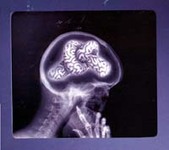
Angela Bartoli
To protect the password card
from theft, there is one possibility. First, randomly generate and memorize a
secret key composed of 12 numbers between 0 and 35 (one for each line of the
card). Then for each letter of the mnemonic, shift this letter to the right
(looping around the end of the line back to its beginning if needed) by the
amount indicated by this line's secret key's digit before reading the symbol.
For an 8-symbol mnemonic, the entropy of this secret key is 41.4 bits, which
gives a reasonnable amount of protection to the card even if it is stolen.
One obvious drawback is of course the strain it puts on the brain (although
some may say it's good for the organ's health to work it out this way) and the
time it takes to read one password. Another drawback is that the secret key is
hard to remember, and if you forget it, you loose all your passwords.
Translating the secret key into letters and digits might make it easier to
remember.
[ Posté le 18 août 2011 à 17:24 |
pas de
commentaire |
lien permanent ]
Adresse de trackback
https://weber.fi.eu.org/blog/Informatique/a_more_complicated_passwordcard.trackback
Commentaires
Aucun commentaire
Catégories : [ TV/Cinéma ]
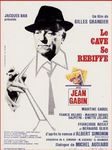
cinema-francais.fr
Éric Masson, vendeur de voitures américaines d'occasion, apporte à ses
usuriers, Charles Lepicard et Lucas Malvoisin, au lieu de l'argent qu'il leur
doit, une proposition : imprimer de la fausse monnaie. Le mari de sa maîtresse
est un graveur hors-pair qui travaillait (à son insu) pour un faux-monnayeur
qui vient d'être arrêté, et il prétend pouvoir convaincre ce Cave de
travailler pour eux. Lepicard, tenancier d'un hotel de passe fermé par la
police, propose de faire revenir de sa retraîte à Caracas le Dabe, ancien
faux-monnayeur. Ce dernier accepte mais veut prendre 50% des bénéfices. Les
trois autres tentent alors d'acheter le double de papier et de produire le
double de faux billets. Mais le Dabe, en discutant avec le Cave, se rend
compte de quelque chose, et le convainc de n'imprimer que la quantité convenue
initialement, ce qui lui laisse le temps de nettoyer l'imprimerie avant que
les autres n'arrivent pour prendre livraison des billets. Le Dabe et le Cave
partent ensuite ensemble pour Caracas.
[ Posté le 18 août 2011 à 10:19 |
pas de
commentaire |
lien permanent ]
Adresse de trackback
https://weber.fi.eu.org/blog/TV/Cinema/le_cave_se_rebiffe.trackback
Commentaires
Aucun commentaire
Mardi, 16 août 2011
Traduction: [ Google | Babelfish ]
Catégories : [ Informatique ]
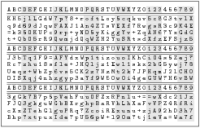
The PasswordCard
sounds like a good idea (and it actually may be in practice), but I don't like
it so much for three reasons:
- The entropy is too low (64 bits spread over 232 symbols) and generated from
an unknown source of entropy.
- You have to memorize a cryptic symbol and a color for each password, which
makes it easy to forget which symbol/color pair is associated with what
password.
- I didn't invent it :)
My current idea is to generate a similar card using a hardware random
number generator
so that each symbol on the card has an entropy of 6 bits (2592 bits in total
on he card). I also would like to get rid of the method that consists in
choosng one spot on the card and reading in one direction, and instead use the
card as a lookup table for a substitution cipher: you choose a cleartext
mnemonic for a given website with a length corresponding to the length of the
password you want to generate (e.g., “EXAMPLEC” for an 8-symbol password to
be used on example.com), and you generate the corresponding password by
looking up the symbol corresponding to “E” on the first row of the card,
then the one corresponding to “X” on the second row, “A” on the third,
“M” on the fourth, and so on.
The drawbacks are numerous:
- Reading a password this way is very slow and error-prone (the
alternating gray and white areas and the repeated header lines make it only
slightly less painful).
- Generating two passwords from the same card is fine as long as the two
mnemonics don't share the same characters in the same positions (e.g.,
“EXAMPLEC” and “EXNIHILO” share “EX” in positions 1 and 2) (if this is
the case, the entropy of those particular symbols will be divided by the
number of passwords sharing them).
- The mnemonics are meant to be easy to remember, and therefore easy to guess
by the thief of the card (that's howerver only slightly worse than the case of
the stolen PasswordCard).
- It requires a computer to generate a card that is readable in a small
format, so the random bits are temporarily stored on a system that may be
compromised (if the physical size of the card does not matter, you can
generate such a card by rolling a pair of 6-sided dice about 729 times and
writing the symbols down by hand).
There is one benefit though: the card looks very geeky :)
As usual, any comment/idea/criticism is welcome.
[ Posté le 16 août 2011 à 23:14 |
1
commentaire |
lien permanent ]
Adresse de trackback
https://weber.fi.eu.org/blog/Informatique/a_better_passwordcard.trackback
Commentaires
A More Complicated PasswordCard!
Commentaire N° 1, Blog & White
le 17 août 2011 à 18:19
Lundi, 15 août 2011
Traduction: [ Google | Babelfish ]
Catégories : [ TV/Cinéma ]

Wikipedia
Frank Martin is kidnapped and coerced into transporting a package, in the
company of a girl. Both wear bracelets that explose if they get too far from
the car. The kidnapper tels Frank to go first to Budapest, then Bucarest, and
finally Odessa. Frank soon understands that the package is the girl, who
happens to be the daughter of the Ministry of the Environment of Ukraine. The
latter is thus blackmailed into accepting several loads of toxic waste into
his country for processing, while at the same time preparig for a speech on
saving the environment. Frank delivers the girl to the villain, escapes the
goons, chases them in his car while they are on a train by landing with the
car on top the train. He eventually kills the villain with his own bracelet
and saves the girl just before her father reluctantly signs the authorization
papers.
[ Posté le 15 août 2011 à 16:16 |
pas de
commentaire |
lien permanent ]
Adresse de trackback
https://weber.fi.eu.org/blog/TV/Cinema/transporter_3.trackback
Commentaires
Aucun commentaire
Traduction: [ Google | Babelfish ]
Catégories : [ Bricolage/Arduino | Informatique ]

Software random number generators are usually so-called pseudo-random number
generators, because they produce a deterministic sequence of numbers that have
some of the properties of true random numbers. Obtaining genuinly random
numbers howerver requires a non-deterministic processus as the source of
randomness. Thermal noise in electronics or radioactive decay have been used,
usually requiring an external device to be built and plugged to the computer.
Peter Knight's TrueRandom
generates random bits by using the Arduino's ADC (with nothing connected to
the analog input pin) to measure electronic noise. It flips the pin's
internal pull-up resistor while the measure takes place to increase the amount
of noise. The software then keeps only the least significant bit of the
result, filters it using Von Neumann's whitening algorithm (read pairs of bits
until they are of different values and return 0 (respectively 1) on a 01
(respectively 10) transition). There are several functions that generate
different types of numbers based on those random bits.
I reused that code, modified it to allow using another pin than the Arduino's
Analog0 and I made my own random number generator. I also wrote a Python script
that reads the bits from the serial port, uses the SHA-1 hashing algorithm to
distil the data (the raw data has about 6 bit of entropy per byte, distillation
produces data with 7.999 bits of entropy per byte; based on the work of Jeff
Connelly on IMOTP) and writes them to the
standard output or into a file. On my Duemilanove, it can output about 1500
bits/s, while it outputs 1300 bits/s on a JeeLink.
The latter makes it an easy-to-transport device that is reasonnably sturdy and
fits in the pocket, even if its features (it contains a radio transceiver) are
a bit overkill for the job (not to mention expensive).
I also adapted the core of the TrueRandom software to run on my
ButtonBox (which
is conveniently always connected to my desktop computer). There the
output rate is a mere 300 bps, but it's still reasonnably fast for generating
a few random numbers when needed (for example for generating one's own
PasswordCard).
The access to the ButtonBox is shared among multiple clients using
button_box_server.py,
so a modified Python script was used for obtaining the stream of random bits
through the button_box_server.
I haven't had the patience to generate a few megabytes of random data to test
the generator with the DieHarder
test suite, but the output of Fourmilab's ent
test tool looks reasonnable.
[ Posté le 15 août 2011 à 11:08 |
2
commentaires |
lien permanent ]
Adresse de trackback
https://weber.fi.eu.org/blog/Bricolage/Arduino/hardware_random_number_generator.trackback
Commentaires
A Better PasswordCard?
Commentaire N° 1, Blog & White
le 16 août 2011 à 23:05
Dieharder Test
Commentaire N° 2, Blog & White
le 23 août 2011 à 09:48
Dimanche, 14 août 2011
Catégories : [ Livres ]

© Amazon.fr
Nicky DeSota est conseiller en prêts hypothécaires dans un monde à la morale
rigoriste, contrôlé par les arabes producteurs de pétrole. Il a été arrêté par
l'agent du FBI Nyla Christophe parce qu'il avait vu en train de cambrioler un
laboratoire secret, relevé d'empreinte digitales à l'appui. Nicky a cependant
un alibi et de nombreux témoins qui le placent à l'autre bout des États-Unis
au moment des faits. Dans un autre monde, parallèle à celui-ci, le Sénateur
Dominic DeSota doit quitter le concert que donne sa maîtresse, Nyla Bowquist,
pour se rendre au laboratoire de Sandia où on a appréhendé un suspect
ressemblant comme deux gouttes d'eau au sénateur, empreintes digitales à
l'appui. Ce dernier est le Commandant DeSota, venant d'un monde parallèle ou
l'on a réussi à se déplacer entre les mondes parallèles, et il disparaît
brusquement. Plus tard, il revient à la tête d'un commando qui prend
possession du laboratoire et, se faisant passer pour le sénateur, annonce que
les gens de son monde vont passer par celui-ci pour déposer des bombes
atomiques en URSS (qui dans ce monde-ci panse ses blessures après une guerre
avec la Chine), les faire repasser dans l'URSS de leur monde et les faire
exploser. Le sénateur, ainsi que d'autres prisonniers, sont envoyé dans le
monde du Commandant, accompagnés par le sergent Sambok, une copie de Nyla
Bowquist. Le sénateur parvient à la séduire, l'assomer et à partir vers un
monde aléatoire en emmenant avec lui l'opérateur du portail qui permet de
voyager entre les mondes. Ils se retrouvent dans le monde de Nicky, sont
arrêtés et interrogés par le FBI. Peu après, l'armée du commandant s'empare de
la Maison Blanche du monde du sénateur et la guerre éclate à Washington. Dans
le monde du commandant, d'autres voyageurs paratemporels arrivent et emmênent
les protagonistes vers le monde du sénateur. Ces voyageurs sont les premiers
inventeurs du voyage entre les mondes parallèles et essayet de replacer chacun
dans son monde d'origine (sauf Nicky et l'agent Christoph) ; ils leur
expliquent aussi que tout voyage entre les mondes provoque des phénomènes de
transferts aléatoires entre des mondes aléatoires, et qu'il faut pour cela
limiter les voyages. Un peu plus tard, tous ceux qui ont voyagé se retrouvent
dans un endroit inconnu. Ils ont été déplacés, définitivement, vers une Terre
en ruine où une guerre bactériologique a tué tous les primates, par des
humains qui avaient découvert le voyage paratemporel avant tous les autres et
qui ont décidé d'y mettre un terme. Le sénateur parvient à faire venir sa Nyla
dans ce nouveau monde, et Nicky, devenu agriculteur, finit par épouser
l'ex-agent du FBI.
[ Posté le 14 août 2011 à 11:21 |
pas de
commentaire |
lien permanent ]
Adresse de trackback
https://weber.fi.eu.org/blog/Livres/l_avenement_des_chats_quantiques.trackback
Commentaires
Aucun commentaire
Samedi, 13 août 2011
Traduction: [ Google | Babelfish ]
Catégories : [ Bière/FAVORITES | Bière/Williams ]

“golden summer ale brewed with a blend of Belgian pale malt, Nelson Sauvin &
Amarillo hops and a later infusion of fresh elderflowers.”
Very flowery smell, very fruity and quite sweet taste. Very good. Contains
wheat and malted barley.
Williams Bros Brewing Co., Alloa, Scotland. 4.3% alcohol.
[ Posté le 13 août 2011 à 20:10 |
pas de
commentaire |
lien permanent ]
Adresse de trackback
https://weber.fi.eu.org/blog/Biere/Williams/williams_birds_and_bees.trackback
Commentaires
Aucun commentaire
Vendredi, 12 août 2011
Traduction: [ Google | Babelfish ]
Catégories : [ Informatique ]
It all started a few days ago with this Xkcd strip.
Someone pointed it out passwordcard.com to me,
and it made me wonder how safe are the passwords generated with that tool.
Those passwords are meant to be used on all those websites that require you
to create a user account with a password. Using a single password for all those
web sites means that when the attacker of one of those websites gets your
password, he can access your account on every other website where you have an
account.
Beware that I'm no mathematician, and neither am I a specialist in
cryptography or information theory, but here are my thoughts on this system.
The generator is based on what looks like a 64-bit key, so in theory, the
entropy is 64 bits, which is reasonnably much (it would take 6x108
years to break at 1000 attempts per second). However, since you need to feed
the key to an unknown web server, the practical entropy is much less, since
someone else than you knows the key. But let's assume you can generate the
card yourself on a secure computer.
The symbols on the card are upper- and lower-case letters, and digits, which
makes overall 62 possible combinations. This gives 5.95 bits of entropy per
such symbol, if the symbol is randomly generated. Since the card is generated
from 64 bits of entropy, you can take up to 10.7 symbols to generate one or
more passwords without loosing any entropy. That is, a password made of one
symbol will have 5.95 bits of entropy, a password made of two symbols will
have twice that (11.9 bits), three symbols will be 17.9 bits and so on. If you
take more than 10.7 symbols, the entropy of each symbol will be reduced, so
that the entropy of the symbols in all your passwords altogether will never
exceed 64 bits. For example, if you take 16 symbols to make 2 passwords of 8
symbols each, the entropy of each password will be 32 bits instead of the 47.6
bits of a single, 8-symbol password. A 32-bits-of-entropy password takes 50
days to break (at the example rate above) against about 7000 years for the
47.7-bit-of-entropy password.
Here are a few examples of password types and strengths:
- 1 password of 6 symbols: 35.7 bits of entropy, cracked in 1.8 years
- 1 password of 7 symbols: 41.7 bits of entropy, cracked in 112 years
- 1 password of 8 symbols: 47.7 bits of entropy, cracked in 7000 years
- 2 passwords of 6 symbols each: 32 bits of entropy, cracked in 50 days
- 2 passwords of 7 symbols each: 32 bits of entropy, cracked in 50 days
However, if the card is stolen, the thief only has to test a few tens of
thousands combinations to find a password made of 4-8 symbols (29 x 8 symbols,
8 reading directions and 5 possible password-lengths is 55680), which
represent 15.8 bits of entropy and takes less than a minute to crack.
Loosing the card is therefore a bad move.
As a conclusion, the password card is fine on the following three conditions:
- Use a real random number for the key (e.g., by rolling 25 times a 6-sided
die) or a hardware random number generator (there will be a post on that
soon).
- Use the card for passwords totalizing no more than 10 symbols (best to use
only one password of 8, 9 or 10 symbols).
- Do not lose your PasswordCard.
Disclaimer: once again, I'm no specialist in cryptography or information
theory, but the above is based on how I understand those things. It may be
completely wrong.
[ Posté le 12 août 2011 à 21:52 |
2
commentaires |
lien permanent ]
Adresse de trackback
https://weber.fi.eu.org/blog/Informatique/password_management_with_passwordcard.trackback
Commentaires
Hardware Random Number Generator
Commentaire N° 1, Blog & White
le 13 août 2011 à 16:32
A Better PasswordCard?
Commentaire N° 2, Blog & White
le 16 août 2011 à 23:05
Mardi, 9 août 2011
Traduction: [ Google | Babelfish ]
Catégories : [ TV/Cinéma ]
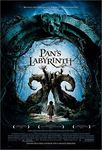
Wikipedia
Espagne, 1944. Un capitaine de l'armée fasciste fait venir sa nouvelle épouse,
enceinte, et sa fille Ofelia, dans son camp dans la montagne. Il a pour ordre
d'éradiquer les maquisards communistes, opposants au régime. Ofelia, férue de
contes de fées, découvre le labyrinthe qui se trouve à coté du camp et y
rencontre un faune. Ce dernier lui explique qu'elle est la réincarnation de
l'esprit de la princess Moanna, qui doit un jour retourner au monde
souterrain. Ofelia doit accomplir trois tâches avant la pleine lune, afin de
prouver sa valeur. La première tâche consiste à faire avaler des pierres
magiques à un crapaud géant vivant sous un arbre creux, et lui permet de
trouver une clé. La deuxième consiste à prendre une dague dans la demeure d'un
ogre sans réveiller ce dernier. Ofélia parvient de justesse à prendre la
dague, mais réveille le monstre parce qu'elle a ignoré les conseils du faune.
Ce dernier est faché et disparait. Peu après, la mère d'Ofelia meurt en
couches. Le docteur ne peut cepenant pas l'aider, car il vient d'être tué par
le capitaine, qui avait découvert ses liens avec les rebelles. Ofelia est
ensuite capturée en train de fuir avec une servante qui était aussi une
rebelle. Cette dernière parvient à blesser le capitaine et à s'enfuir. Le
faune réapparait et lui dit de prendre le bébé dans la chambre du capitaine et
de le rejoindre dans le labyrinthe. Là il lui dit qu'une goutte de sang du
bébé ouvrira le portail vers le monde souterrain. Ofelia refuse de blesser
l'enfant, et est découverte par le capitaine (qui ne voit pas le faune), qui
reprend le bébé et tire sur Ofélia. Pendant ce temps, les rebelles attaquent
le camp, récupèrent le bébé et tuent le capitaine. Le sang d'Ofélia coule sur
la pierre-portail, et tandis qu'Ofelia meurt, l'esprit de Moanna retrouve ses
parents dans le monde souterrain, le faune lui dit qu'elle a réussi à
accomplir la troisième épreuve, à savoir préférer verser son sang que celui
d'un innocent.
[ Posté le 9 août 2011 à 18:03 |
pas de
commentaire |
lien permanent ]
Adresse de trackback
https://weber.fi.eu.org/blog/TV/Cinema/le_labyrinthe_de_pan.trackback
Commentaires
Aucun commentaire
Dimanche, 7 août 2011
Catégories : [ TV/Cinéma ]
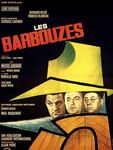
© Allociné
Benard Shah, marchand d'armes mais aussi acquéreur de brevets sur les armes
bactériologiques et nucléaires, meurt à Paris dans une maison close. Francis
Lagneau, agent secret français se faisant passer pour le cousin de Benard
Shah, est chargé de ramener discrètement le corps à sa femme, Amaranthe,
résident dans un chateau en Allemagne, ainsi que de récupérer lesdits brevets.
Il n'est pas seul sur le coup, des agents allemand, suisse et soviétiques se
présentent aussi comme amis du défunt. Un américain se présente plusieurs
fois, sans couverture, offrant une somme toujours plus importante pour les
brevets, mais se fait jeter par la fenêtre par les quatre agents européens.
Des asiatiques se sont aussi introduits dans le chateau par divers passages
secrets et éliminent le personnel pour prendre leur place. Ils sont finalement
éliminés à leur tour par les européens. Les agents ont pour ordre de séduire
la veuve, mais seul le français y parvient, et part avec elle à Lisbonne
chercher les brevets dans un coffre de banque. Ils sont rejoints par les trois
autres agents et par l'américain. Les premiers s'enfuient en train vers la
France, font des plans de voyage de noce, mais sont à nouveau rejoints par les
quatre concurrents. Lagneau éjecte les trois européens du train, mais
Amaranthe lui dit que l'américain l'a menacée pour qu'elle lui donne les
brevets. Lagneau retrouve l'agent, lui reprend les brevets et ejecte le
concurrent à son tour. Finalement, Amaranthe lui montre le chèque de quatre
millions de dollars que l'américain lui avait donné en payement.
[ Posté le 7 août 2011 à 11:10 |
pas de
commentaire |
lien permanent ]
Adresse de trackback
https://weber.fi.eu.org/blog/TV/Cinema/les_barbouzes.trackback
Commentaires
Aucun commentaire
Mercredi, 3 août 2011
Traduction: [ Google | Babelfish ]
Catégories : [ Livres ]

© Amazon.fr
Robinette (sic) Broadhead est devenu immensément riche en abandonnant son
travail de mineur sur Terre et en devenant prospecteur à la grande porte, un
astéroide transformé en base d'exploration spatiale par les Heechees, une
civilisation longtemps disparue. La base contient des milliers de vaisseaux
préprogrammés pour des destinations que les humains ne peuvent pas prévoir.
Les pertes humaines sont nombreuses, mais en cas de découverte importante, les
gains peuvent être colossaux. Depuis son retour sur Terre, Robinette n'est pas
heureux et consute une pshychothérapeute robotisé qui essaye de lui faire
exprimer la douleur qu'il refoule. Ensemble, ils évoquent sa peur de partir en
mission, et les trois missions auxquelles il a participé : la première est
revenue sans rien trouver, lors de la deuxième il est arrivé par hasard à la
Grande porte 2 (qui était déjà connue, mais qui nécessitait d'emprunter un
chemin beaucoup plus long), ce qui a donné aux scientifiques de la Grande
porte l'idée d'envoyer deux vaisseaux à 30 secondes d'intervalle vers une
même destination aléatoire, la distance séparant les deux vaisseaux permettant
d'en apprendre davantage sur la méthode de sélection de la destination. Klara,
la femme qu'il aime et avec qui il a une histoire d'amour mouvementée, fait
partie de l'équipage. Les deux vaisseaux arrivent effectivement à destnation,
mais cette dernière se révèle être juste à la bordure de l'horizon des
événements d'un trou noir. Pour repartir, les deux équipages se regroupent
dans un seul vaisseau et utilisent le deuxième pour obtenir une poussée
supplémentaire. Robinette reste accidentellement coincé dans le deuxième, et
c'est finalement lui qui rentre, laissant les neuf autres personnes, y compris
Klara, prisonniers du temps ralenti du trou noir. Robinette se sentait
coupable d'avoir assassiné Klara et avait refoulé ce souvenir.
[ Posté le 3 août 2011 à 22:07 |
2
commentaires |
lien permanent ]
Adresse de trackback
https://weber.fi.eu.org/blog/Livres/la_grande_porte.trackback
Commentaires
et la suite...
Commentaire N° 1, Rico (Savigny-le-temple, France)
le 21 août 2011 à 21:03
Commentaire N° 2, Matthieu Weber (Jyväskylä, Finlande)
le 21 août 2011 à 21:28
















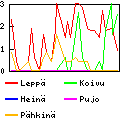





“Light version of the traditional IPA. Whitens is steeped with Cascade hops… floral aroma with hints of spice, citrus and orange”
Most probably the same as Little Valley's Withens IPA.
This time, I could easily notice the hint ...